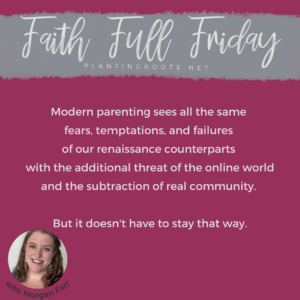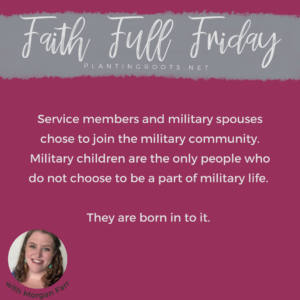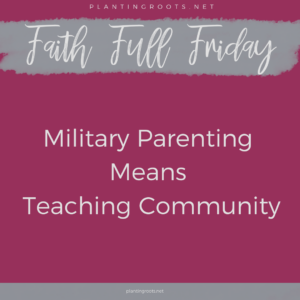Join us as Morgan Farr shares why military parenting means teaching community.
Military Parenting Means Teaching Community
by Morgan Farr
April is a special time in the military community.
This is when we celebrate the most precious part of the military family, the month of the military child.
Parenting is Hard
Sir Francis Bacon said, “The joys of parents are secret, and so are their grieves and fears.” If this was true for him in the 1500s, how much more true is it today?

While having constant communication at our fingertips, parents feel more lonely than ever, especially in a post-pandemic world.
According to a recent study by The Cigna Group,
- 65% of parents and guardians are classified as lonely.
- Mothers are especially likely to be considered lonely (69%), which is seven points higher than the rate of loneliness among fathers (62%).
- Single parents are particularly likely to struggle with loneliness, as more than 77% classify as lonely.
Modern parenting sees all the same fears, temptations, and failures of our renaissance counterparts with the additional threat of the online world and the subtraction of real community. But it doesn’t have to stay that way.
The Military Takes
These statistics are taken from the community at large; when you add in military life, things get even more complicated.
With the draft ending on January 27, 1973(1), the United States military became an all-volunteer rather than conscription. The last continuously serving draftee retired in 2014(2). That means that service members and military spouses chose to join the military community. Military children are the only people who do not choose to be a part of military life.
They are born into it.
What exactly are military children born into?
There are challenges to military life:
- The average time between PCS moves is two years(3).
- Deployments are commonplace and can impact a child’s mental health(4).
- A typical military school can experience up to 50 percent yearly turnover (5).
There are also a lot of positives:
- There are roughly 1.2 million military kids of active duty members worldwide(6), so there are many opportunities for friendships!
- They learn the importance of service (8).
- They learn resilience and adaptability (9).
- 80% of military children say they can relate to anyone, regardless of race, ethnicity, religion, or nationality(7).
The German writer Johann Wolfgang von Goethe wrote, “There are only two lasting bequeaths we can hope to give our children. One of these is roots the other wings.” Military life offers parents a unique opportunity to give our children both roots and wings.
A considerable part of that is helping them learn to build community.
Teaching Community
Ecclesiastes 4:9-12 says,
Two are better than one, because they have a good reward for their toil. For if they fall, one will lift up his fellow. But woe to him who is alone when he falls and has not another to lift him up! Again, if two lie together, they keep warm, but how can one keep warm alone? And though a man might prevail against one who is alone, two will withstand him—a threefold cord is not quickly broken.
Moves will happen, deployments may come, and challenges are all but guaranteed in military life. A critical factor in parenting our military kids well is to model community. Having a community to lean on is crucial, so if you fall, someone is there to help you back up. They can help with tangible needs as well as prayerfully covering military kids.

Community Can…
- be already established at your duty station
- be something you have to create when you get there
- mean sharing life with other families that get it
- mean having a trusted friend to babysit
- involve meal trains from your church or small group
- involve opening your home for playdates, coffee dates, or hobbies
The most important thing you can teach your children is to do the same as they age. Nearly 80% of recent troops come from a family where someone served in the military before them(10). This means that there is a high likelihood that today’s military children will become military members and spouses needing community tomorrow.
Teaching military kids what a genuine community looks like means you must model it for them. Show them how to love sacrificially when a family needs a babysitter. Show how to give when you make a meal for a family with a deployed parent. Show them what it means to accept help when you need it.
That way, when they are ready to go out in the world or don the uniform themselves, they can join or create a community of support for military life.
Resource List
- Read the introduction for Month of the Military Child here.
- Read the introduction for our Faith Full Friday series here.
- Find our Topical Resource Lists here.






